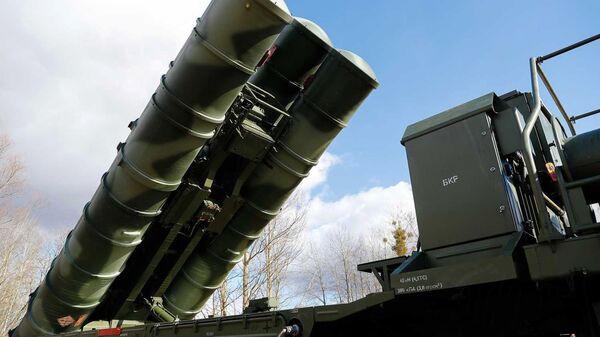US President Trump has offered his Turkish counterpart Recep Tayyip Erdogan a set of economic inducements for better US-Turkey relations, according to The Washington Post.
In a letter to Erdogan last week, Trump told the Turkish president that the US would guarantee a $100 billion trade deal, as well as a scheme to avoid US sanctions over Turkey’s purchase of Russia’s S-400 missile defence system, albeit on certain conditions, the American edition cited unnamed administration officials as saying.
To US' 'Satisfaction'
A senior official noted that one of the conditions of the deal that needs to be met by the Turkish side to is “the S-400 thing” that should be resolved to the US’ “satisfaction”.
Per the official, there is a new red line that has been set up by the administration with regard to the Russian-manufactured S-400s: the White House demands that they “do not become operational” in a way that would allow them “access to our F-35 communications and defences”.
“The achievement of any bilateral trade goal first requires concrete progress toward resolving major issues, such as Turkey’s purchase of Russia’s S-400", another source explained, implying the potential quid pro quo.
The US has been at loggerheads with Turkey, having been threatening sanctions over the country’s purchase of S-400s, under the so-called CAATSA (Countering America's Adversaries Through Sanctions Act) legislation, ever since Ankara first negotiated S-400 deliveries and signed a deal with Russia back in 2017.
Senior administration officials noted earlier this year that the mere delivery of the military equipment would be unacceptable. NATO claimed the system would compromise the stealth capabilities of the new-generation F-35 combat jets, the delivery of which to Turkey was blocked by the US when Russia completed the first shipment of S-400 components in late July 2019.
The second round of the deliveries was finalised in late September, ahead of schedule.
Ceasefire in Syria
According to the cited sources, there is another important condition to be met by Erdogan to secure the deal – that is adherence to the truce in the Syrian-Turkish standoff.
“Once we got the cease-fire, of sorts, we decided to put the package, including the visit, back on the table”, one of the officials said, referring to the 17 October ceasefire agreement negotiated with Vice President Mike Pence a week after the operation kicked off.
Erdogan's Rescheduled Visit?
The recently penned letter hit the headlines just ahead of Erdogan’s visit to the United States on Wednesday, which had reportedly been planned long before Turkey’s operation and but was subsequently put hold.
Despite the ceasefire on Syria's north-eastern border, the Turkish president’s arrival in Washington has spawned criticism in Congress:
“It’s absolutely shameful that President Trump has invited President Erdogan to the White House after Erdogan attacked our Syrian Kurdish allies”, and forces under Turkish command “have committed what this administration itself describes as war crimes”, said Sen. Chris Van Hollen (D-Md.).
Van Hollen notably spearheaded a bill last month to impose sanctions on Turkey over its operations on the Syrian border – a set of measures under the CAATSA legislation.
Behind Peace Spring Op
Turkey’s Operation Peace Spring started on 9 October and was paused after a ceasefire was declared on 17 October. According to Ankara, it aimed to oust both Daesh* fighters and Kurdish militants, whom it considers to be PKK-linked terrorists, from the border area and set up a security zone for Syrian refugees there.
Less than a week before the operation started, Trump announced a US withdrawal from Syria, except a small contingent for maintaining security in the area, with the move enraging Kurdish militias, whom the US had previously been allied with.
*Daesh (also known as ISIS/ISIL/IS) is a terrorist group banned in Russia


